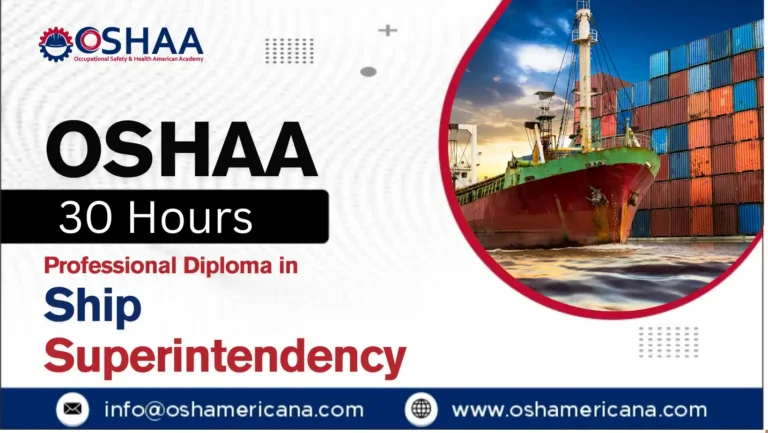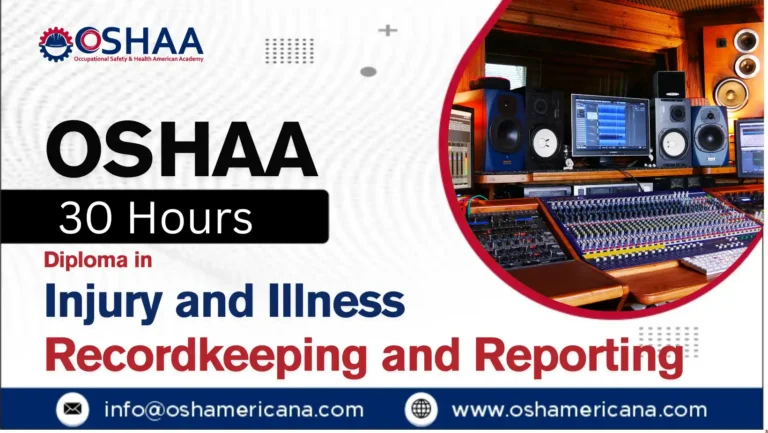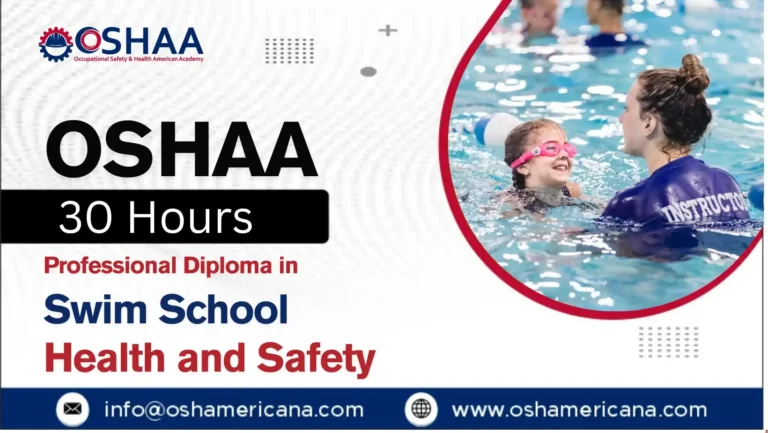Gain vital skills with the OSHAA 30-Hours Professional Diploma in Confined Space Safety. Ensure compliance, reduce risks, and enhance workplace safety.
The OSHAA 30-Hours Professional Diploma in Confined Space Safety is a comprehensive training program developed for professionals who manage, supervise, or work within confined spaces. This course provides participants with an in-depth understanding of OSHA regulations, confined space entry requirements, hazard recognition, and emergency preparedness. By combining expert instruction with practical applications, the program equips learners with the ability to handle confined space operations confidently while maintaining compliance with regulatory standards.
Confined space environments present some of the most complex risks in the workplace, making specialized training essential for worker safety and organizational compliance. OSHA’s regulations surrounding confined space entry are strict, and failure to adhere to these standards can result in severe consequences, including financial penalties, legal liability, and preventable injuries or fatalities. The OSHAA 30-Hours Professional Diploma in Confined Space Safety directly addresses these challenges by empowering participants with the skills necessary to implement safe work practices, mitigate risks, and foster a culture of safety within their organizations.
Completing the OSHAA 30-Hours Professional Diploma in Confined Space Safety is more than just regulatory compliance—it reflects a strong professional commitment to workplace safety and personal development. For employees, it provides a career advantage by enhancing qualifications and demonstrating advanced safety competencies. For employers, having trained professionals certified in confined space safety strengthens operational resilience, ensures legal compliance, and positions the organization as a responsible, safety-conscious leader in its industry.
Throughout the OSHAA 30-Hours Professional Diploma in Confined Space Safety, participants gain a solid foundation in OSHA standards, hazard identification techniques, atmospheric testing, use of protective equipment, entry permits, and emergency response procedures. By mastering these areas, learners are prepared to lead safe confined space operations, protect their workforce, and respond effectively to potential emergencies. The training also emphasizes best practices in communication, teamwork, and leadership, all of which are critical to maintaining safe and efficient operations.
The OSHAA 30-Hours Professional Diploma in Confined Space Safety is essential for workers, supervisors, safety managers, and organizational leaders who are responsible for overseeing confined space activities. The knowledge and skills gained from this program ensure not only compliance with OSHA and global safety standards but also long-term improvements in workplace safety culture and operational excellence. By completing this course, participants contribute to safer environments, reduced risks, and stronger professional credibility within their industries.
OSHAA 30-Hours Professional Diploma in Confined Space Safety
To enroll in the OSHAA 30-Hours Professional Diploma in Confined Space Safety, learners are expected to meet the following criteria:
Age Requirement
- Applicants must be at least 18 years of age to enroll in the OSHAA 30-Hours Professional Diploma in Confined Space Safety.
- This minimum age requirement ensures that learners have the maturity and responsibility needed to understand and apply the safety principles taught in the course.
- Confined space safety involves high-risk environments, making it essential that participants meet this age requirement for both legal and practical reasons.
Educational Background
- A minimum of a high school diploma or equivalent is recommended for learners enrolling in the OSHAA 30-Hours Professional Diploma in Confined Space Safety.
- While higher education is not mandatory, individuals with advanced qualifications in occupational safety, engineering, or related fields will find it advantageous for deepening their understanding of technical concepts.
- This educational foundation ensures that participants can effectively grasp OSHA regulations, confined space entry protocols, and workplace safety requirements.
Work Experience
- Prior work experience in construction, manufacturing, oil and gas, or safety management is recommended but not compulsory for admission into the OSHAA 30-Hours Professional Diploma in Confined Space Safety.
- Professionals with existing exposure to confined space operations will benefit from advanced applications, while newcomers will acquire foundational knowledge that prepares them for future responsibilities.
- The course is designed to accommodate both experienced workers and individuals seeking to build a strong professional profile in occupational safety and health.
English Proficiency
- Learners enrolling in the OSHAA 30-Hours Professional Diploma in Confined Space Safety must be able to read, write, and speak English fluently.
- Proficiency in English is essential to understand the course materials, regulatory frameworks, and OSHA safety guidelines covered in the training.
- Effective communication in English ensures that participants can fully engage with course content, interpret technical safety documents, and apply compliance standards in practical workplace settings.
By meeting these eligibility requirements, learners are well-positioned to succeed in the OSHAA 30-Hours Professional Diploma in Confined Space Safety and to apply the knowledge gained toward improving workplace safety, regulatory compliance, and professional growth.
Study Units
The Learning Outcomes of the OSHAA 30-Hours Professional Diploma in Confined Space Safety are designed to ensure participants gain advanced technical skills, compliance expertise, and safety leadership abilities. This course equips learners with the knowledge and confidence to recognize hazards, implement effective confined space safety programs, and meet OSHA and international safety standards. By mastering both theoretical principles and practical applications, learners will be prepared to safeguard lives, reduce risks, and uphold professional safety practices across industries.
- Introduction to Confined Space Safety
- Gain a clear understanding of what constitutes a confined space and why these environments present significant risks.
- Learn the essential principles of confined space safety and how they integrate with OSHA regulations.
- Develop awareness of the potential hazards that can arise and the importance of proactive safety management.
- Acquire foundational knowledge that prepares learners for advanced confined space operations.
- Hazard Recognition and Risk Assessment
- Identify physical, chemical, and environmental hazards specific to confined spaces.
- Master risk assessment techniques to evaluate hazards before, during, and after confined space entry.
- Learn to apply control measures that minimize risks and ensure compliance with workplace safety standards.
- Strengthen analytical skills to anticipate hazards and take preventive action.
- Confined Space Entry Permit Systems
- Understand the role of permit systems in controlling confined space operations.
- Learn how to prepare, issue, and manage entry permits in compliance with OSHA guidelines.
- Develop the ability to verify conditions before entry and ensure that all safety measures are met.
- Enhance accountability and traceability in confined space operations through effective permit management.
- Atmospheric Testing and Monitoring
- Gain proficiency in using atmospheric testing equipment to detect toxic, flammable, and oxygen-deficient environments.
- Learn the sequence and importance of pre-entry and continuous monitoring.
- Understand how to interpret readings and take corrective actions when hazardous conditions are detected.
- Apply OSHA standards to ensure atmospheric safety during all confined space work.
- Confined Space Equipment and Personal Protective Equipment (PPE)
- Learn about the selection, inspection, and maintenance of confined space safety equipment.
- Understand the correct use of personal protective equipment, including respiratory protection, harnesses, and protective clothing.
- Gain the ability to match specific equipment to different confined space hazards.
- Develop confidence in implementing equipment protocols that meet OSHA compliance requirements.
- Rescue and Emergency Response Procedures
- Acquire knowledge of OSHA-compliant confined space rescue plans and procedures.
- Learn how to organize and execute safe and effective rescue operations.
- Understand the roles and responsibilities of standby personnel and emergency responders.
- Build practical skills that ensure preparedness for emergencies, minimizing risk to both workers and rescuers.
- Confined Space Safety Program Development
- Develop the ability to design and implement a comprehensive confined space safety program.
- Learn how to integrate policies, training, and procedures that align with OSHA regulations.
- Understand how to monitor program effectiveness and drive continuous improvement.
- Gain leadership skills to foster a culture of safety within organizations.
- Legal and Regulatory Responsibilities
- Understand the legal implications of confined space incidents and the importance of compliance.
- Learn about OSHA standards, international regulations, and employer responsibilities.
- Gain the ability to align workplace practices with regulatory frameworks to avoid penalties.
- Strengthen professional accountability by ensuring adherence to legal and ethical obligations.
By completing the OSHAA 30-Hours Professional Diploma in Confined Space Safety, learners will be equipped to lead safety initiatives, manage high-risk environments, and ensure strict compliance with OSHA and international standards. This course prepares professionals to build safer workplaces, protect lives, and promote a culture of continuous safety excellence across industries.
The OSHAA 30-Hours Professional Diploma in Confined Space Safety provides participants with a wide range of benefits that directly enhance workplace safety, regulatory compliance, and professional growth. This course is highly relevant for industry professionals, organizations, and stakeholders who must meet strict OSHA and international safety standards while ensuring safe and efficient confined space operations. By completing this diploma, learners gain practical skills, technical knowledge, and leadership capabilities that support career advancement and organizational excellence.
- Enhanced Knowledge of Confined Space Safety
Participants develop a deep understanding of confined space environments, hazards, and safety procedures, ensuring they are equipped with the expertise to prevent accidents and manage risks effectively. - Regulatory Compliance with OSHA Standards
The course ensures that learners are well-versed in OSHA regulations and global safety requirements, reducing the risk of non-compliance penalties while safeguarding organizations against legal consequences. - Improved Hazard Identification Skills
Professionals learn to recognize physical, chemical, and environmental hazards in confined spaces, enabling them to take proactive measures that significantly reduce risks for workers. - Strengthened Emergency Preparedness
The training prepares learners to develop and implement effective rescue and emergency response procedures, ensuring quick and safe actions during critical situations. - Comprehensive Risk Assessment Techniques
Graduates gain advanced skills in conducting risk assessments, enabling them to evaluate potential threats before confined space entry and ensure all preventive measures are in place. - Mastery of Entry Permit Systems
Participants learn to design, implement, and manage confined space entry permits, creating structured processes that improve accountability and ensure compliance with safety regulations. - Advanced Use of Safety Equipment and PPE
The course provides in-depth training on the selection, inspection, and proper use of safety equipment and personal protective equipment, enhancing worker protection in high-risk environments. - Workplace Incident Reduction
Through the application of learned safety principles, organizations benefit from a significant reduction in workplace accidents, injuries, and fatalities, leading to improved worker well-being. - Professional Career Advancement
Earning the OSHAA 30-Hours Professional Diploma in Confined Space Safety enhances career prospects by demonstrating advanced safety expertise, regulatory knowledge, and leadership abilities. - Organizational Reputation and Trust
Employers with certified professionals gain recognition as responsible and safety-conscious organizations, building trust with clients, stakeholders, and regulatory bodies. - Cost Savings and Operational Efficiency
By reducing workplace incidents, organizations minimize downtime, compensation claims, and regulatory fines, resulting in long-term cost efficiency and improved productivity. - Development of Safety Leadership Skills
The course cultivates leadership abilities by preparing participants to guide safety initiatives, train teams, and foster a strong safety culture across organizations. - Global Recognition of Certification
The diploma is internationally respected, providing professionals with a credential that enhances mobility and recognition in industries worldwide. - Continuous Improvement and Innovation
Participants are encouraged to develop safety programs that evolve with industry trends and regulatory updates, ensuring organizations remain compliant and adaptive. - Contribution to Safer Work Environments
By applying their knowledge, certified professionals contribute to creating safer workplaces, protecting lives, and promoting a culture of continuous safety improvement across industries.
Completing the OSHAA 30-Hours Professional Diploma in Confined Space Safety equips learners with advanced knowledge, regulatory expertise, and leadership skills that are vital for maintaining compliance, reducing workplace risks, and driving professional excellence. This program benefits both individuals and organizations by strengthening safety performance, enhancing reputations, and ensuring long-term operational success.
The OSHAA 30-Hours Professional Diploma in Confined Space Safety is designed for a diverse audience of professionals who play critical roles in workplace safety, operations management, and compliance oversight. This course is highly relevant to industry professionals, organizations, and stakeholders who must adhere to OSHA regulations and international safety standards. By targeting those directly responsible for confined space operations and safety leadership, the program supports global compliance, risk management, and professional development.
- Safety Managers
- Oversee workplace safety programs and implement safety strategies across operations.
- The course provides them with advanced tools to design and monitor confined space safety plans.
- They gain the knowledge to conduct hazard assessments and enforce compliance with OSHA standards.
- Strengthens their ability to lead teams in reducing risks and maintaining operational efficiency.
- Operations Supervisors
- Manage day-to-day site operations where confined space entry may be required.
- Learn how to apply confined space safety practices that improve workforce protection.
- Acquire the ability to ensure operations meet regulatory and organizational safety benchmarks.
- Enhance operational oversight by integrating OSHA-compliant confined space entry protocols.
- HSE Officers
- Monitor health, safety, and environmental compliance within organizations.
- This course equips them with specialized knowledge in confined space hazard management.
- Improves their ability to train staff in OSHA safety procedures for confined space entry.
- Strengthens their capacity to ensure compliance with both local and international safety standards.
- Engineers and Technical Staff
- Often required to design, inspect, or maintain equipment in confined spaces.
- The course provides them with knowledge of safety equipment, PPE, and testing protocols.
- Enhances their ability to assess risks before conducting technical operations.
- Ensures they follow OSHA guidelines while performing high-risk confined space activities.
- Emergency Response Teams
- Responsible for confined space rescue and emergency procedures.
- The training prepares them to act quickly and safely during critical incidents.
- Enhances their skills in atmospheric testing, monitoring, and emergency response planning.
- Ensures compliance with OSHA emergency preparedness requirements.
- Contractors and Subcontractors
- Frequently engaged in short-term confined space work across multiple sites.
- Learn how to adopt consistent OSHA-compliant safety practices regardless of the worksite.
- Strengthens their ability to manage risks and protect teams during temporary projects.
- Provides certification that enhances credibility and competitiveness in the industry.
- Maintenance and Facility Staff
- Regularly tasked with inspections, repairs, and cleaning inside confined spaces.
- This course equips them with knowledge of PPE, monitoring tools, and entry permits.
- Improves their ability to work safely in compliance with OSHA confined space standards.
- Supports their role in minimizing risks while ensuring ongoing facility safety.
- Construction Professionals
- Work in environments where confined space entry is common, such as tunnels and tanks.
- Learn OSHA-compliant practices for confined space operations within construction projects.
- Gain the ability to assess risks and enforce safety protocols on dynamic job sites.
- Enhance their professional development with specialized confined space safety expertise.
- Oil and Gas Industry Workers
- Frequently exposed to confined spaces such as storage tanks and pipelines.
- The course prepares them to manage hazards specific to oil and gas confined space operations.
- Equips them with advanced knowledge to reduce incidents and improve compliance.
- Supports industry-wide adherence to OSHA standards and global safety benchmarks.
- Organizational Leaders and Compliance Officers
- Oversee compliance and corporate responsibility for safety management systems.
- The course provides them with insights into OSHA regulations and global best practices.
- Enhances their ability to develop policies that strengthen organizational safety culture.
- Demonstrates leadership in workplace safety, improving reputation and regulatory trust.
The OSHAA 30-Hours Professional Diploma in Confined Space Safety equips participants across diverse roles with advanced technical expertise, professional skills, and OSHA-compliant certifications. By completing this program, learners are prepared to lead safety initiatives, ensure compliance with global standards, and promote operational excellence, contributing to safer workplaces and sustainable professional growth.







